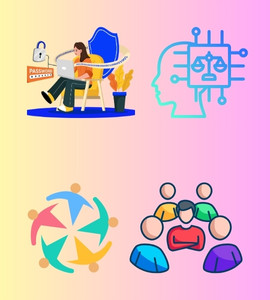Virtual Singapore: A Digital Gateway to Urban Innovation
 A comprehensive 3D model of the entire city at your fingertips – Virtual Singapore! It isn’t just a virtual playground; it’s a powerful tool for progress. From urban planning to emergency response, this platform empowers users across various sectors to explore, innovate, and make data-driven decisions for the betterment of Singapore. Virtual Singapore serves as a testing ground for smart city solutions, where IoT sensors, AI algorithms, and data analytics converge to optimize urban services, improve mobility, and enhance the overall quality of life for residents. This blog will explore the transformative impact of Virtual Singapore on urban innovation, highlighting its role in data-driven decision-making, collaborative urban planning, citizen engagement, and global influence.
A comprehensive 3D model of the entire city at your fingertips – Virtual Singapore! It isn’t just a virtual playground; it’s a powerful tool for progress. From urban planning to emergency response, this platform empowers users across various sectors to explore, innovate, and make data-driven decisions for the betterment of Singapore. Virtual Singapore serves as a testing ground for smart city solutions, where IoT sensors, AI algorithms, and data analytics converge to optimize urban services, improve mobility, and enhance the overall quality of life for residents. This blog will explore the transformative impact of Virtual Singapore on urban innovation, highlighting its role in data-driven decision-making, collaborative urban planning, citizen engagement, and global influence.
What is Virtual Singapore?
 At its core, Virtual Singapore is a meticulously detailed 3D model that offers users an immersive exploration of the city’s landscape. This digital twin of the city-state represents a paradigm shift in urban planning, facilitated by a collaborative effort between the National Research Foundation (NRF), the Singapore Land Authority (SLA), and the Government Technology Agency of Singapore (GovTech). In Virtual Singapore, the engineering and construction industry harnesses the power of digital twins to simulate and optimize infrastructure projects, paving the way for more efficient and sustainable urban development.
At its core, Virtual Singapore is a meticulously detailed 3D model that offers users an immersive exploration of the city’s landscape. This digital twin of the city-state represents a paradigm shift in urban planning, facilitated by a collaborative effort between the National Research Foundation (NRF), the Singapore Land Authority (SLA), and the Government Technology Agency of Singapore (GovTech). In Virtual Singapore, the engineering and construction industry harnesses the power of digital twins to simulate and optimize infrastructure projects, paving the way for more efficient and sustainable urban development.
Genesis of Virtual Singapore
Launched officially in December 2014 as part of Singapore’s groundbreaking Smart Nation initiative, this innovative project has been years in the making. Prior to its grand unveiling, Virtual Singapore was meticulously researched and developed, with an astonishing $73 million allocated for its creation and exploration of related technologies over five years. Now, it stands as a collaborative masterpiece between the National Research Foundation Singapore, the Singapore Land Authority, and the Infocomm Development Authority of Singapore. While an exact completion date remains elusive, initial plans targeted its deployment by 2017 or 2018.
Digital Twin Concept
Virtual Singapore is the result of collective effort. It begins with boots on the ground, surveyors meticulously mapping the city’s contours. Aerial photographers take flight, capturing its essence from above. Government agencies share their wealth of data, piece by piece.
Virtual Singapore owes its existence to a multitude of factors:
Data Acquisition:
Geospatial Data Foundation: Virtual Singapore’s digital twin begins with the acquisition of geospatial data. This includes conducting high-resolution LiDAR scans, which utilize lasers to meticulously map the 3D geometry of buildings, infrastructure, and natural elements like trees. Additionally, detailed aerial imagery captured from airplanes contributes to the visual information, enriching the dataset with textures, colors, and overall city layout.
Integration of Existing Datasets: To further enrich the dataset, Virtual Singapore integrates pre-existing data from various government agencies. This includes valuable information such as building blueprints, utility maps, and potentially even real-time traffic flow data, providing a comprehensive foundation for the digital twin.
3D Modeling & Visualization:
Utilization of Specialized Software Platforms: The acquired geospatial data and existing datasets are synthesized using specialized software platforms like Dassault Systèmes’ 3DEXPERIENCE City platform. These platforms serve as the digital workshop, where the disparate data sources are seamlessly combined into a cohesive and detailed 3D model of Virtual Singapore.
Tailored Level of Detail: Depending on the intended purpose, the level of detail within the digital twin varies accordingly. While building exteriors and street layouts are meticulously rendered to facilitate precise planning, interiors or underground infrastructure may initially exhibit less granularity.
Real-Time Data Integration:
Dynamic Integration of Sensor Networks: To enhance the dynamism of the digital twin, Virtual Singapore may integrate real-time data streams from sensor networks deployed throughout the city. These networks could encompass a variety of sensors, including those monitoring traffic, weather, and energy usage within buildings.
Simulation & Analysis: By merging the 3D model with real-time data, Virtual Singapore enables planners to conduct simulations and analyses. These simulations provide valuable insights into the potential impacts of changes within the physical cityscape, aiding in informed decision-making processes.
Collaboration & Accessibility:
Centralized Platform for Collaboration: The digital twin of Virtual Singapore is likely hosted on a centralized platform, accessible to authorized users from various government agencies and private entities involved in urban planning and infrastructure projects.
Facilitation of Informed Decision-Making: This shared platform fosters collaboration and data exchange, enabling informed decision-making on a wide range of urban planning, resource management, and infrastructure development initiatives, ultimately contributing to the sustainable growth and management of Virtual Singapore.
Virtual Singapore: Urban Planning and Development
At its core, Virtual Singapore offers users an immersive 3D model of the city-state, meticulously crafted to provide a detailed exploration of its landscape. What sets it apart is its integration of real-time data gathered from a network of sensors spread across the city. This infusion of live data transforms Virtual Singapore into a dynamic platform, offering insights into various aspects of city life, from environmental conditions to transportation trends.
Navigating Singapore's Urban Challenges: From Floods to Digital Twins
Beyond its visual appeal, Virtual Singapore is semantically enriched, providing a deeper understanding of the city’s elements. Each building, street, and landmark is more than just a graphic; it’s a repository of valuable information intelligently processed by the system. This semantic depth empowers researchers and planners to conduct nuanced simulations and analyses, facilitating informed decision-making.
- Confronting Flash Floods: Singapore has grappled with the challenge of flash flooding, spurred by torrential rain events that led to nine damaging floods in 2011. In response, the nation-initiated efforts to address this issue while also confronting the complexities of land use in a small island nation boasting the world’s highest population density exceeding one million inhabitants.
- Mapping the Terrain: To optimize land utilization amidst these challenges and identify flood-prone areas, the Singapore Land Authority (SLA) embarked on a comprehensive mapping endeavor in 2012, culminating in the creation of a 3D map of the country. Subsequently, GPS Lands Singapore proposed the development of Virtual Singapore, a digital replica leveraging Bentley Systems software. Utilizing laser-scanning aircraft and vehicle-mounted lasers, the mapping team meticulously recorded terrain and street-level data to enrich the aerial imagery.
- Integrating Data for Informed Decision-Making: Integration of these diverse datasets by GPS Lands Singapore birthed a unified platform enabling users to visualize and validate information crucial for informed urban planning and design. Recently finalized, Virtual Singapore stands as the pioneering digital twin of a nation, presenting a finely detailed 3D rendition of the entire country. This resource has been shared across governmental agencies to facilitate asset management and decision-making, encompassing detailed management of green spaces and trees.
- Delving Beneath the Surface: Beyond the visible landscape, the SLA is embarking on the subsequent phase of the project: creating a national subsurface digital twin of Singapore. This initiative responds to the reality that a significant portion of the city-state’s utility infrastructure lies underground, preserving precious above-ground space. However, as Singapore continues to expand both vertically and horizontally, even subterranean real estate is becoming increasingly scarce.
Consider its practical applications: from predicting the impact of natural disasters to optimizing energy efficiency through solar panel placement, Virtual Singapore serves as a testbed for innovative urban solutions. By simulating proposed developments and interventions, stakeholders can assess their potential effects comprehensively, leading to more effective planning strategies.
Moreover, Virtual Singapore fosters collaboration across sectors, serving as a platform for government agencies, academic institutions, and private organizations to converge and address complex urban challenges collectively. As the project nears its slated public deployment in 2018, its transformative potential becomes increasingly apparent.
Virtual Singapore: Urban Resilience and Sustainability
 Singapore is renowned for its commitment to forward-thinking urban planning initiatives. A prime example is Jewel Changi, which epitomizes the city-state’s dedication to sustainable construction and green building practices. From the outset, the project aimed for the prestigious Green Mark Platinum certification from Singapore’s Building and Construction Authority (BCA). Now, Virtual Singapore, a project utilizing digital twin technology to create a 3D model of the city-state. This essay explores how Virtual Singapore contributes to urban resilience and sustainability. It focuses on its role in enhancing resilience, promoting sustainability, and fostering collaboration among stakeholders.
Singapore is renowned for its commitment to forward-thinking urban planning initiatives. A prime example is Jewel Changi, which epitomizes the city-state’s dedication to sustainable construction and green building practices. From the outset, the project aimed for the prestigious Green Mark Platinum certification from Singapore’s Building and Construction Authority (BCA). Now, Virtual Singapore, a project utilizing digital twin technology to create a 3D model of the city-state. This essay explores how Virtual Singapore contributes to urban resilience and sustainability. It focuses on its role in enhancing resilience, promoting sustainability, and fostering collaboration among stakeholders.
Enhancing Urban Resilience: Through advanced urban planning tools and techniques, Virtual Singapore enables stakeholders to collaboratively design, simulate, and optimize urban spaces, fostering inclusive growth and equitable development. Virtual Singapore aids in fortifying urban resilience by enabling proactive planning and response strategies. Through simulations, authorities can anticipate disasters, develop evacuation plans, and fortify critical infrastructure. Real-time traffic data integration optimizes mobility and emergency response. Monitoring infrastructure health enables timely maintenance, minimizing disruptions.
Promoting Sustainability: Virtual Singapore supports sustainable urban development by identifying opportunities for energy efficiency improvements and evaluating environmental impacts of development projects. It promotes the integration of green spaces into urban landscapes and encourages sustainable transportation systems, reducing emissions.
Fostering Collaboration: Virtual Singapore serves as a platform for data sharing among government agencies, enhancing coordination and decision-making. It engages citizens in urban planning by providing visual representations of proposed projects, fostering community involvement and understanding.
Virtual Singapore: Citizen Engagement and Empowerment
 It holds immense potential for citizen engagement and empowerment, acting as a bridge between residents and city authorities. This essay explores how Virtual Singapore can empower citizens, fostering a more collaborative and informed approach to urban development.
It holds immense potential for citizen engagement and empowerment, acting as a bridge between residents and city authorities. This essay explores how Virtual Singapore can empower citizens, fostering a more collaborative and informed approach to urban development.
Transparency and Accessibility:
Virtual Singapore facilitates transparency and accessibility in urban planning through various means: Project Visualization: Residents can virtually explore proposed developments, such as new parks or transportation networks, in a 3D environment. This fosters transparency and public dialogue by allowing citizens to understand and engage with projects before they are implemented. Data Sharing: Serving as a repository of public data related to urban planning, Virtual Singapore empowers citizens to stay informed about decisions impacting their communities, promoting transparency and accountability.
Public Participation and Feedback:
Virtual Singapore enables meaningful citizen participation and feedback mechanisms: Interactive Platforms: Integration with online forums or surveys allows residents to provide feedback on proposed projects, ensuring that developments align with community needs and preferences. Idea Generation and Collaboration: Virtual workshops hosted on the platform facilitate citizen brainstorming sessions, encouraging residents to contribute ideas for improving their neighborhoods and shaping the city’s future.
Promoting Civic Education and Awareness:
Virtual Singapore serves as an educational tool, raising civic awareness and understanding: 3D Learning Experiences: Interactive educational tools explain complex urban planning concepts in a user-friendly manner, promoting awareness about sustainability practices and city challenges. Gamification for Engagement: Interactive games or simulations based on Virtual Singapore make urban planning concepts engaging and accessible, fostering citizen engagement, particularly among younger generations.
Challenges and Considerations:
Several challenges must be addressed to maximize the effectiveness of Virtual Singapore in citizen empowerment: Digital Divide: Equitable access to technology and digital literacy skills is essential to prevent exclusion of certain population segments from participation. Data Privacy: Transparent handling of data collection and usage is crucial for building trust with citizens and ensuring their privacy rights are protected. Moderation and Feedback Management: Effective mechanisms for managing online discussions and facilitating constructive feedback are necessary for the platform’s success in fostering meaningful citizen engagement.
Moving Forward:
By addressing these challenges and leveraging the potential of Virtual Singapore, citizen engagement can be transformed. Empowering citizens is vital for building a resilient, sustainable, and inclusive future for Singapore. Virtual Singapore serves as a conduit for connecting residents to their city, fostering a sense of shared responsibility and ownership in shaping Singapore’s urban future.
Virtual Singapore: Challenges and Ethical Considerations
 While Virtual Singapore offers innovative approaches to urban planning and citizen engagement, it encounters challenges and ethical considerations that require careful examination. Imagine Virtual Singapore recommends the expansion of digital healthcare services to enhance access to medical care. This initiative raises concerns about data privacy as the platform collects sensitive health information from residents. Additionally, there’s apprehension about algorithmic bias potentially favoring certain medical conditions or treatment options, impacting equitable healthcare delivery for all residents. The following are some of the critical areas of concern, highlighting the importance of addressing data privacy, algorithmic bias, accessibility and equity, and control and public perception.
While Virtual Singapore offers innovative approaches to urban planning and citizen engagement, it encounters challenges and ethical considerations that require careful examination. Imagine Virtual Singapore recommends the expansion of digital healthcare services to enhance access to medical care. This initiative raises concerns about data privacy as the platform collects sensitive health information from residents. Additionally, there’s apprehension about algorithmic bias potentially favoring certain medical conditions or treatment options, impacting equitable healthcare delivery for all residents. The following are some of the critical areas of concern, highlighting the importance of addressing data privacy, algorithmic bias, accessibility and equity, and control and public perception.
Data Privacy Concerns:
Data Collection & Security: The extensive data collection within Virtual Singapore demands robust security measures to safeguard against breaches and protect citizen privacy. Data Ownership & Transparency: Clear guidelines on data ownership and usage transparency are essential for fostering public trust and ensuring responsible data management practices.
Algorithmic Bias:
Fairness and Equity: The potential use of algorithms in Virtual Singapore necessitates rigorous checks to prevent bias, ensuring fair outcomes for all communities. Human Oversight: Incorporating human oversight in decision-making processes is critical to mitigate the risk of unintended consequences arising from algorithmic outputs.
Accessibility and Equity:
Digital Divide: Efforts must be made to bridge the digital divide, ensuring equitable access to Virtual Singapore for all citizens, regardless of technological proficiency. Socioeconomic Disparities: Initiatives should address socioeconomic disparities to ensure inclusive participation and representation from diverse communities.
Control and Public Perception:
Loss of Control Narrative: Concerns regarding centralized decision-making highlight the need for genuine collaboration and participatory governance in Virtual Singapore initiatives. Public Perception and Misinformation: Strategies to combat misinformation and promote an accurate understanding of Virtual Singapore’s functionalities are essential for fostering public trust.
Addressing the Challenges:
Open Dialogue and Transparency: Establishing open communication channels between authorities and citizens is crucial for fostering transparency and addressing concerns related to Virtual Singapore. Stakeholder Collaboration: Involving diverse stakeholders in the development and operation of Virtual Singapore can provide valuable insights and ensure that the platform meets the needs of all stakeholders. Ethical Frameworks and Governance: Developing robust ethical frameworks and governance structures is essential for guiding responsible data practices and ensuring ethical decision-making in Virtual Singapore initiatives.
Virtual Singapore: Future Prospects and Global Impact
Virtual Singapore emerges as an exceptional model with promising future prospects and significant global influence. As a compact city-state without abundant natural resources, its reliance on international trade and multinational corporations (MNCs) sets it apart. The substantial presence of MNCs, such as Seagate Technology, plays a crucial role in global production and export strategies, elevating Singapore’s status as a key player in the global economy. Moreover, Singapore’s economic strength is closely tied to its world-class port, renowned as one of the busiest and most advanced globally. This port facilitates Singapore’s exceptional trade-to-GDP ratio, highlighting its significance as a global trade hub. Furthermore, Singapore’s financial and business services sector serves as a vital link to global markets, reinforcing its position as an economic powerhouse.
As Virtual Singapore evolves, it holds the potential to offer innovative solutions to urban challenges worldwide. By leveraging emerging technologies like artificial intelligence and big data analytics, Virtual Singapore can address complex urban issues effectively. Its integration of smart city technologies and emphasis on global collaboration set a positive example for cities striving to enhance sustainability and resilience in urban development. Through partnerships and knowledge-sharing initiatives, Virtual Singapore can influence the global urban agenda, contributing to discussions on urban planning practices. In doing so, Virtual Singapore not only strengthens its own position as a global leader in urban innovation but also fosters the development of more livable and equitable cities worldwide.
Experion Technologies offers promising solutions that align perfectly with the vision of creating innovative urban environments akin to Virtual Singapore. Here's how we can deliver:
Expertise in Product Engineering: Experion Technologies is a frontrunner in product engineering, equipped with a diverse skill set and a proven track record of delivering cutting-edge solutions. Our team comprises seasoned engineers, designers, and data scientists who are adept at turning concepts into reality.
Advanced Data Integration and Analysis: Leveraging our expertise, we excel in integrating and analyzing vast amounts of data from disparate sources. Whether it’s real-time sensor data, geospatial information, or demographic statistics, we have the capabilities to extract meaningful insights that drive informed decision-making.
Innovative Simulation and Visualization Tools: Our team specializes in developing innovative simulation and visualization tools that provide a holistic view of urban landscapes. By incorporating technologies such as AR, VR, and 3D modeling, we empower stakeholders to explore, analyze, and interact with virtual environments in unprecedented ways.
Predictive Modeling and AI-driven Solutions: Experion Technologies harnesses the power of AI and predictive modeling to anticipate future trends and challenges in urban development. Through sophisticated algorithms and machine learning techniques, we can forecast scenarios, optimize resource allocation, and enhance the resilience of cities.
Collaborative Approach and Custom Solutions: We believe in a collaborative approach, working closely with clients to understand their unique needs and challenges. Whether it’s developing custom software applications, deploying IoT solutions, or implementing smart city initiatives, we tailor our services to meet specific requirements and deliver tangible results.
Commitment to Sustainability and Innovation: At Experion Technologies, we are committed to sustainability and innovation. We strive to develop solutions that not only improve efficiency and productivity but also promote environmental stewardship and social equity. By embracing emerging technologies and best practices, we pave the way for smarter, more resilient cities of the future.
Conclusion
Looking ahead, Virtual Singapore holds boundless possibilities. From optimizing transportation routes to enhancing public safety through predictive analytics, the platform opens new avenues for innovation and progress. As stakeholders continue to leverage its capabilities and solicit input from diverse sources, Virtual Singapore emerges as not just a technological marvel but a catalyst for Singapore’s journey towards a smarter, more resilient future and an inspiring tech marvel.
Key Takeaways
- Virtual Singapore revolutionizes decision-making by integrating real-time data from various sectors.
- Collaboration among government agencies underscores Virtual Singapore’s significance as a national initiative.
- The accuracy and reliability of Virtual Singapore stem from meticulous data acquisition and integration.
- Stakeholders leverage Virtual Singapore’s dynamic simulation capabilities for data-driven decisions.
- Virtual Singapore proactively addresses urban challenges such as flooding through advanced mapping.
- Sustainability is prioritized in Virtual Singapore, identifying energy-efficient solutions and promoting green spaces.
- Citizen engagement flourishes as Virtual Singapore promotes transparency and accessibility in urban planning.
- Ethical concerns surrounding data privacy and algorithmic bias necessitate careful management in Virtual Singapore’s development.
- Virtual Singapore’s global influence is evident through its innovative solutions and collaborative initiatives.
- Virtual Singapore serves as a model for smart city initiatives worldwide, emphasizing data-driven strategies.
- The platform fosters inclusivity by empowering citizens to participate in shaping their urban environment.
- Continuous refinement and adaptation ensure Virtual Singapore remains at the forefront of urban innovation.
- Virtual Singapore’s success hinges on its ability to address complex urban challenges through technology and collaboration.
- As cities embrace digital transformation, Virtual Singapore stands as a beacon of progress and possibility.

